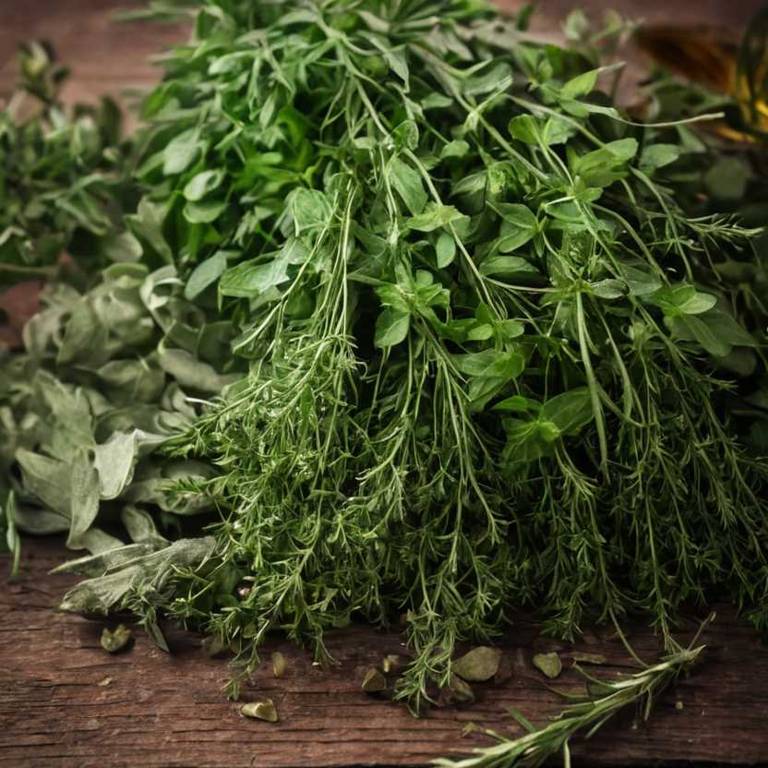By Leen Randell
Updated: Jul 20, 2024
10 Medicinal Constituents Of Leonurus Cardiaca (Motherwort)

Leonurus cardiaca has active constituents such as iridoid glycosides, flavonoids, and phenolic acids.
These constituents possess anti-inflammatory, antispasmodic, and vasodilatory properties. They can help alleviate anxiety, insomnia, and menstrual cramps, promoting relaxation and improving sleep quality.
Moreover, motherwort's constituents may also contribute to cardiovascular health by reducing blood pressure and improving circulation, ultimately leading to a better quality of life for individuals with heart-related conditions.
This article explains in details the 10 best active constituents of Leonurus cardiaca.
1. Rosmarinic acid
Leonurus cardiaca rosmarinic acid is a bioactive compound extracted from its aerial parts.
It has been traditionally used in Chinese medicine for centuries to treat various cardiovascular and respiratory disorders. Rosmarinic acid exhibits potent antioxidant and anti-inflammatory activities, which may contribute to its therapeutic effects.
Recent studies have also demonstrated its ability to inhibit the growth of cancer cells and reduce lipid peroxidation, making it a promising compound for further research and potential applications in disease treatment.
2. Caffeic acid
Leonurus cardiaca caffeic acid is a phenolic compound that has been isolated from its leaves and stems.
This bioactive compound has been found to exhibit various pharmacological properties, including antioxidant, anti-inflammatory, and antimicrobial activities. Caffeic acid has also been reported to possess antiviral and anticancer effects, making it a potential agent in the treatment of various diseases.
Its chemical structure consists of a caffeoyl group attached to a hydroxycinnamic acid core.
3. Quercetin
Leonurus cardiaca quercetin is a bioactive flavonoid compound that has been isolated from its leaves and stems.
This phytochemical exhibits various biological activities, including antioxidant, anti-inflammatory, and cardio-protective effects.
Quercetin has been shown to scavenge free radicals, inhibit lipid peroxidation, and reduce oxidative stress, making it a potential therapeutic agent for the prevention and treatment of cardiovascular diseases and other disorders.
4. Kaempferol
Leonurus cardiaca kaempferol is a flavonoid compound derived from the plant.
It has been traditionally used in Chinese medicine for its cardiovascular benefits, and modern studies have confirmed its ability to reduce blood pressure and improve cardiac function.
Kaempferol has also been shown to exhibit anti-inflammatory and antioxidant properties, making it a potential therapeutic agent for various diseases.
5. Apigenin
Leonurus cardiaca apigenin is a bioactive flavone compound extracted from its leaves.
Apigenin has been extensively studied for its pharmacological activities, including anti-inflammatory, antioxidant, and antimicrobial properties. It has also shown potential in modulating cardiovascular function, alleviating anxiety and depression, and inhibiting the growth of cancer cells.
Additionally, apigenin exhibits antispasmodic and antiarrhythmic effects, making it a valuable component in traditional medicine.
6. Luteolin
Leonurus cardiaca luteolin is a type of flavonoid compound that is extracted from the leaves and stems of the plant.
It has been traditionally used in herbal medicine to treat various health issues, including cardiovascular disease, anxiety, and insomnia.
Luteolin has also been found to have anti-inflammatory and antioxidant properties, making it a promising natural remedy for the prevention and treatment of chronic diseases.
7. Isorhapontigenin
Leonurus cardiaca isorhapontigenin is a bioactive compound isolated from the plant.
It has been found to exhibit various pharmacological activities, including anti-inflammatory, antioxidant, and antimicrobial properties.
Isorhapontigenin has also shown potential in reducing oxidative stress and inflammation, making it a promising candidate for the prevention and treatment of diseases related to these conditions.
8. Leonurinine
Leonurus cardiaca leonurinine is a bioactive compound extracted from the herb.
It has been traditionally used in traditional Chinese medicine to treat various ailments, including cardiovascular and respiratory disorders.
Scientific studies have confirmed its anti-inflammatory and antioxidant properties, making it a potential therapeutic agent for the management of chronic diseases such as atherosclerosis and hypertension.
9. Leocardinine
Leonurus cardiaca leocardinine is a bioactive alkaloid compound isolated from the herb.
It has been traditionally used in Chinese medicine to treat cardiovascular diseases and is believed to have a positive effect on blood pressure.
Leocardinine has also been shown to exhibit anti-inflammatory, antibacterial, and antiviral activities, making it a potential therapeutic agent for various diseases.
10. Quillajoside
Leonurus cardiaca quillajoside is a type of saponin extracted from the leaves and stems of the plant.
It has been traditionally used in Chinese medicine to treat cardiovascular diseases, such as hypertension and arrhythmia, due to its ability to lower blood pressure and improve cardiac function.
Quillajoside has also been studied for its anti-inflammatory and antioxidant properties, making it a potential candidate for the treatment of various diseases.